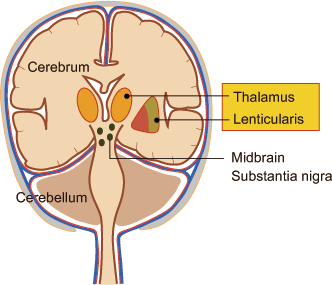- HOME
- For Patients
- Parkinson disease
- Cause of Parkinson disease
Parkinson disease
- About Parkinson disease
- Symptom of Parkinson disease
- Other symptoms of Parkinson's disease
- Cause of Parkinson disease
- Diagnosis of Parkinson disease
- Treatment of Parkinson disease
- Details of surgical treatment
- Surgical treatment of Parkinson disease
- Timing of surgery
- About our team
Cause of Parkinson disease
Parkinson's disease occurs when a substance called dopamine is lacking in the brain
For some reason, the number of cells decreases in a part of the brain called the "substantia nigra". The neurons in the substantia nigra are connected to a structure called the "basal ganglion" (see Figure 1), and dopamine is used by the nerves to communicate with each other.
If insufficient dopamine is being produced due to the decreased number of cells, this results in communication problems between nerves, causing the symptoms of Parkinson's disease. The reason for this decrease in the number of cells has yet to be fully explained and many details are still unknown, but several different factors are probably involved. Onset occurs if dopamine levels fall below 20% of their normal value, with a breakdown in the balance with other neurotransmitters also regarded as a cause of symptoms.
[ fig1 ]








